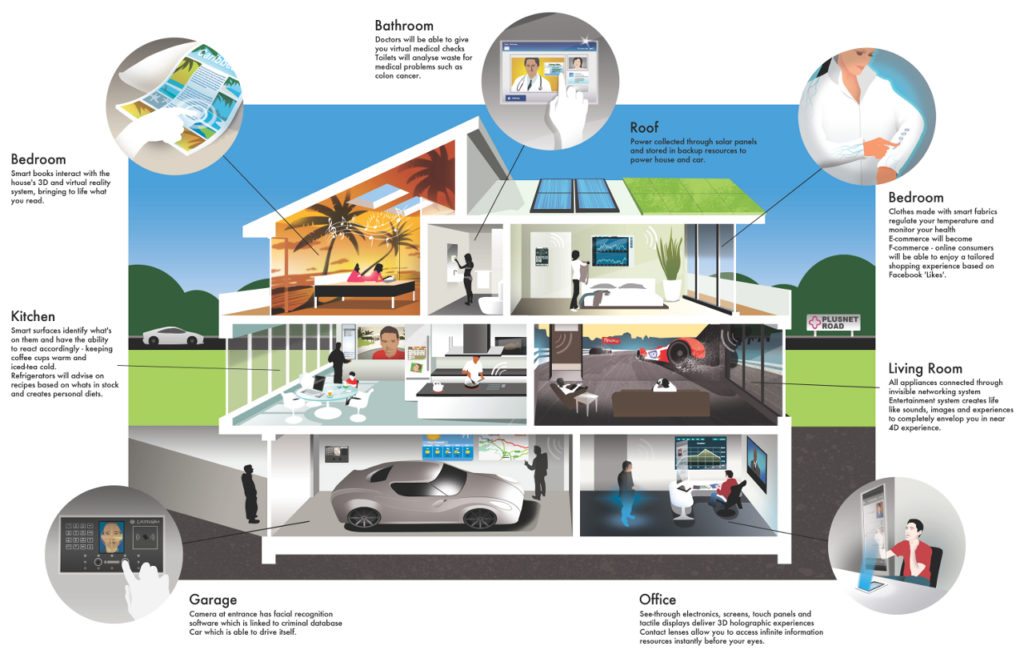
We talk a lot about the Internet of Things (IoT) and have been for a while. Most of us probably don’t see much of it yet. OK, so we have a smartphone but what other smart things do you have? Maybe if you’re in America, you have NEST, Alexa and a Tesla, so you’ve get a semi-smart home and car. The rest of us are just starting to see it. But what happens when things get supersmart?
I’m quite intrigued by this as I used an example almost ten years ago of robots looking after the house: mowing the lawn, looking after an ageing parent and automatically cleaning the house. More recently, we’ve seen some great innovations, like the app that allows someone into your house with a passcode that can be set for permanent access for house members and temporary access for visitors like a plumber or grocery delivery.
But what happens when the whole house is internet-enabled? In that house, you can use biometrics for access; doctors can do medical checks from the bathroom; your home entertainment is so immersive, it’ll feel like you’re on the Holodeck of Star Trek …
Source: futureforall.org
… another of their science fiction visions becoming fact and yes, it may sound futuristic but most of this is here and now.
Take the example of Minority Report (now 14 years old). In the movie, there’s a sequence where Tom Cruise is being chased on the autohighway.
Fourteen years ago, that looked fantasmagorical. Today, it’s a fact thanks to Tesla, Google and the other guys working on self-driving cars and the highways they will run along. It’s not just highways though. There will be superfast trains (think Hyperloop), superfast aircraft that carry you from New York to London in just over 30 minutes that ensure everyone has a clean, happy and healthy life in a low emission, sustainable structure.
Well that’s the plan anyway.
Certainly, there are many projects that are focused upon creating a self-sustaining planet where, instead of using fossil fuels or other dirty power systems, we get all our energy from the Sun. Elon Musk’s company announced just the other day a range of new house tiles that look like tiles but are actually solar panels. The world is changing fast, super-fast, and much of it being driven by the visionary Elon Musk but he’s not alone. For example, Jeff Bezos is quietly building a whole new world through Amazon.
In fact, it seems that we have two sorts of billionaires out there. Those who want to create new solutions for the future (Musk, Bezos and Branson), and those who want to solve present problems in the future (Gates, Buffett, Zuckerberg). Both are doing the right things, but both have different aspirations and objectives. The former are entrepreneurial visionaries whilst the latter are philanthropic angels. Both are to be admired I guess.
Back to point, the future world must cater for billions of people. There are seven billion today and nearer nine billion by 2035, based upon current life expectancy and birth rates. This is a challenge, as illustrated by this NATO discussion:
A greater number of people are living in more, and larger, cities than ever before. The proportion of the global population living in cities as opposed to the countryside exceeded the 50% threshold in 2008.
These new cities are concentrated on the world’s coastlines. Currently 1.4 million people move to cities worldwide every week and the world population is projected to increase to 8.7 billion inhabitants by 2035. By the 2030s, it is estimated five of the world’s eight to nine billion people will live in cities, many of them in slums.
Oh, dear. We need these guys to live in smart cities where they can have smart things in smart homes … why are they living in slums?
As history has shown, conflict occurs where people live, and therefore, most academic and defence research concludes that it is a matter of when, not if, the military will be required to operate in an urban or urban littoral environment. If the Alliance wants to be successful in a future urban conflict, adaptation is not an option it is a must.
Oh no. This is not the future IoT we are talking about. WTF?*
It’s somewhere in between these visions I think. Many have a bleak view of the future – think Rise of the Robots and Homo Deuss – whilst others have a much brighter view. I’m in the latter camp, and think it’s more a reflection of age attitude as to which camp you fall into. What I mean by this is that children are not frightened of the future at all. I mean they want to rush to it so bad. Time goes so slowly when you’re young. When you’re old, time goes too fast. We fear the future as every passing day brings us nearer to the end. Oh, shoot, that’s not good.
So, an older mind fears the future; a younger mind desires it. That’s the fundamental difference for me and is the reason why I can’t wait for tomorrow. Oh, and tomorrow is all about the impact of smart transport, smart cities and smart homes will have on banking and insurance, so there’s a good reason for rushing to tomorrow.
* I mean What’s the Future?
Chris M Skinner
Chris Skinner is best known as an independent commentator on the financial markets through his blog, TheFinanser.com, as author of the bestselling book Digital Bank, and Chair of the European networking forum the Financial Services Club. He has been voted one of the most influential people in banking by The Financial Brand (as well as one of the best blogs), a FinTech Titan (Next Bank), one of the Fintech Leaders you need to follow (City AM, Deluxe and Jax Finance), as well as one of the Top 40 most influential people in financial technology by the Wall Street Journal's Financial News. To learn more click here...




